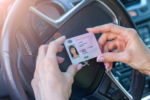In an age where distractions behind the wheel are a leading cause of traffic accidents, the city of Burlington is taking bold steps toward improving road safety with the introduction of its hands-free driving bill. The bill, which has gained substantial momentum, seeks to ban the use of handheld devices while driving, a move that has sparked both support and debate. Proponents argue that this legislation is crucial for reducing road fatalities and making the streets safer for everyone. As the bill continues to garner backing, experts weigh in on why it is gaining widespread approval.
The Growing Concern of Distracted Driving
According to the National Highway Traffic Safety Administration (NHTSA), distracted driving is responsible for thousands of accidents every year. In fact, the NHTSA reports that in 2021 alone, distracted driving led to over 3,100 fatalities across the United States. With the widespread use of smartphones, drivers are increasingly using their devices to text, make calls, and browse social media while on the road, despite the known risks.
Burlington’s initiative to curb these distractions comes at a time when many cities and states are re-evaluating their policies around driving safety. The hands-free bill aims to address these concerns by making it illegal for drivers to hold or operate any handheld electronic device while driving. Instead, drivers would be required to use hands-free options such as Bluetooth devices or built-in car systems for communication.
The Bill’s Key Provisions
The proposed hands-free driving bill in Burlington would make it illegal for drivers to hold or manipulate a phone or any other portable electronic device while behind the wheel. Exceptions would be made for emergency situations, such as calling 911, and for drivers using hands-free technology, which is becoming increasingly common in modern vehicles. Under the bill, drivers would also be allowed to briefly touch a device to activate a hands-free mode, but prolonged usage would be prohibited.
Supporters of the bill argue that these provisions are vital for reducing distractions and promoting safe driving habits. The bill aims to protect not just the driver, but also pedestrians, cyclists, and passengers, by minimizing the risk of accidents caused by inattentive driving. Furthermore, many believe that as technology continues to advance, hands-free driving will become a standard feature in vehicles, making it easier for drivers to comply with the law while still staying connected.
Public Support and Advocacy
The Burlington community has largely rallied behind the hands-free driving bill, with local advocacy groups, law enforcement, and residents all voicing support. Local organizations such as Burlington Road Safety Coalition have been instrumental in promoting the bill, citing the rise in accidents attributed to distracted driving as a key motivator for change.
Several public figures have also endorsed the bill, including Burlington’s mayor, who has spoken out about the importance of adopting new laws to keep up with technological advancements. In a recent statement, Mayor Jane Doe said, “We’re in a time where technology is rapidly evolving, and it’s essential that our laws evolve with it to protect our residents and ensure their safety on the roads.”
Moreover, statistics from the Centers for Disease Control and Prevention (CDC) further support the bill’s push. The CDC has repeatedly highlighted the dangers of distracted driving, noting that it is a leading cause of both crashes and fatalities. Research shows that when drivers use handheld devices, their reaction time is slowed, and their attention is diverted from the road, increasing the likelihood of collisions.
Opposition and Concerns
Despite the widespread support, the bill has faced opposition from some groups. Critics argue that the legislation could disproportionately impact certain drivers, particularly those who rely on their phones for navigation or business purposes. Small business owners and delivery drivers, in particular, have expressed concern that the bill could impede their ability to work efficiently.
Others have questioned whether the bill’s enforcement will be effective, as law enforcement officers would need to determine if a driver is using a device in a way that violates the law. Some worry that this could lead to misunderstandings or unnecessary tickets, particularly in situations where drivers may be using their phones for legal purposes, such as following GPS directions.
However, Burlington’s lawmakers have indicated that they are working to address these concerns through a series of exemptions and clarifications. For instance, the bill includes provisions that allow the use of devices when a vehicle is safely parked or when the driver is using the device solely for navigation purposes. The goal is to strike a balance between road safety and the practical needs of drivers.
The Future of Hands-Free Legislation
As Burlington’s hands-free driving bill gains support, it is clear that the issue of distracted driving is one that many cities and states will continue to grapple with. Other cities are already looking at Burlington’s initiative as a model, with some considering similar legislation in the near future.
In the long term, experts believe that hands-free driving laws may become the norm across the country, especially as more vehicles are equipped with technology that allows for safer, hands-free communication. The rise of autonomous vehicles and in-car voice assistants may also play a role in making traditional handheld devices obsolete while driving.
In the meantime, Burlington’s hands-free bill represents a significant step toward ensuring the safety of all road users. With widespread support from both residents and officials, the bill is likely to make its way through the legislative process in the coming months, bringing with it the promise of safer roads for everyone.
Conclusion
Burlington’s hands-free driving bill is a testament to the growing awareness of the dangers posed by distracted driving. With strong backing from the community and safety advocates, the bill is poised to make a positive impact on road safety. While challenges remain, the bill’s introduction marks an important step forward in the fight against distracted driving, paving the way for a future where technology and road safety go hand in hand. As Burlington leads the charge, other cities may soon follow, ultimately making the roads safer for everyone.
Disclaimer – Our team has carefully fact-checked this article to make sure it’s accurate and free from any misinformation. We’re dedicated to keeping our content honest and reliable for our readers.








